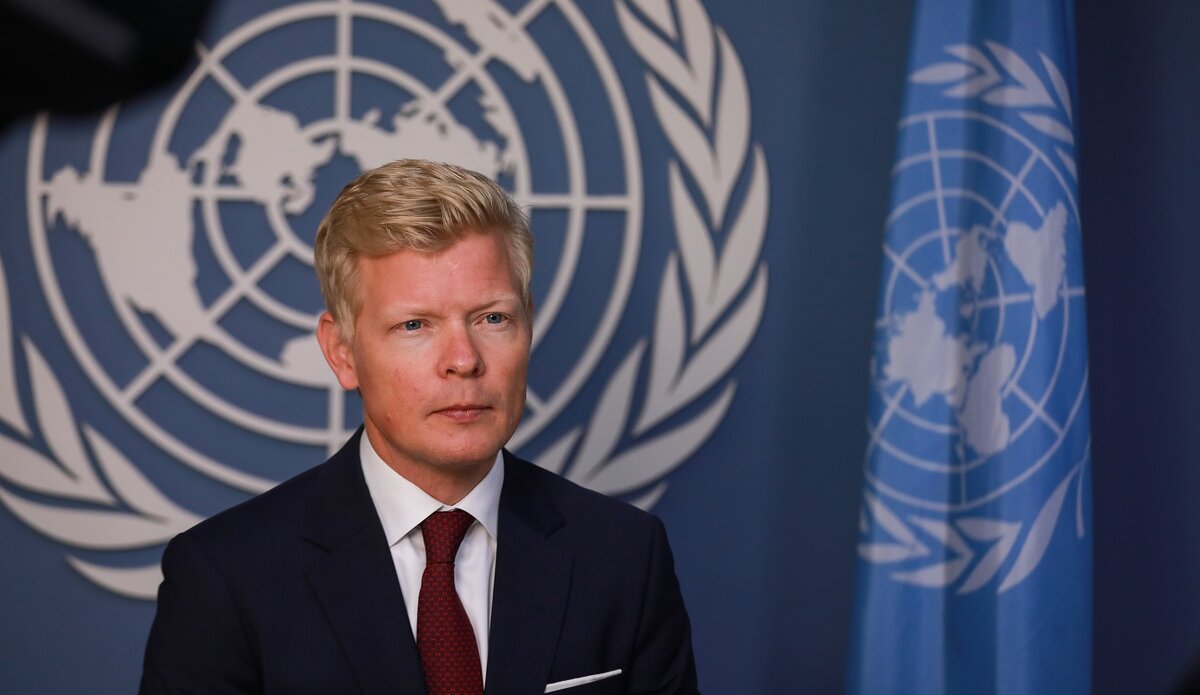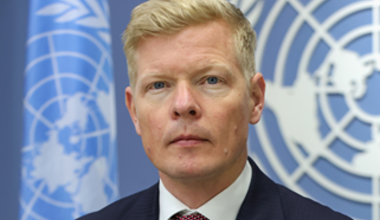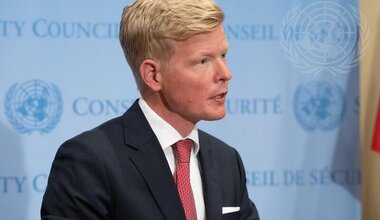Transcript of media stakeout by UN Special Envoy for Yemen, Hans Grundberg, following Security Council briefing
Question: Thanks, Special Envoy. Michelle Nichols from Reuters on behalf of the UN Correspondents Association. Thanks so much for taking the time to brief us. Just wondering if you can give us any idea what has actually been agreed so far in the Saudi Houthi talks and whether their discussions are focused on extending the truce or agreeing a permanent ceasefire, and what are some of the key sticking points?
Special Envoy Hans Grundberg: Thanks. No here I don't think it's wise for me to enter into that here, especially since the discussions, as has been reported by the parties or by both the Saudis and the Houthis themselves, have been reported as positive and constructive, but inconclusive. And there, I think that there are more discussions that might follow from the ones that have been held so far. And my hope and the interaction that I do have, my ongoing interaction with the parties, with the Yemenis, but also with the regional neighbors of Yemen, is to ensure that these efforts go in line and are in support of the United Nations mediated efforts to reach a political settlement. The difficulties or the challenges are the ones that we have seen going back to when we intended to try and push for a more ambitious and extended truce. And that is to ensure that there is an agreement on some immediate issues linked to the economic situation in Yemen, but also that we see commitment to ceasefire and more importantly, also a commitment for political process. That I think is the basis of the discussion that I hope can be in support of the work that I and my office are conducting to go on together with the parties. Thanks.
Question: James Bay, Al Jazeera. So follow up to what you were just talking about. There have been speculation that there would be or there could be more of an agreement by Eid. That's just days away. Is there hope of a breakthrough in just days?
Special Envoy Hans Grundberg: That is not something that I wouldn't hope for such a breakthrough at this point. I think that there's been a lot of speculation in the press about the ongoing discussions. I think that what you can, what you need to do at this particular moment is listen to the messages that have been sent from the parties and from my office as well. And the parties, I think both Ansarullah, through their chief negotiator and the Saudis, through a statement that was issued, I think a couple of days ago, were pretty clear that the discussions in Sana’a were constructive; they were difficult, but they also need further discussions. And I think that at this particular moment, I think they even mentioned that these discussions were to continue after Eid. And that, I think, is what you can rely on when it comes to actual information.
Question: Thank you Mr. Grundberg. We wish you a speedy recovery. My name is Abdul Hamid Saiam and I am the Correspondence of AlQuds Al Arabi. My question is about the rapprochement between Saudi Arabia and Iran and how do you see this new atmosphere will be reflected on the situation in Yemen and how do you analyze that? And my question also as a follow up about the mediation, what role did Oman play? If you can give us some more details about the role of Oman. Thank you.
Special Envoy Hans Grundberg: Thank you very much for that question. As I mentioned earlier just in the beginning, and as I mentioned to the Council, there are several reasons for us to feel encouraged about the ongoing situation in Yemen. We have seen since a year back a state of relative calm that is holding also beyond the expiration of the truce agreement. And this, I think, is an important element because that has then provided political space that has allowed also for deeper and more serious discussions between the different stakeholders. And if you add to that and that brings me to your question, if you add to that the shift towards a constructive dialogue that we have seen on the regional level, this presents for Yemen at least an opportunity. And that is why I have welcomed the announcement that came out of Beijing on the resumption of diplomatic relations between Iran and Saudi Arabia, because I do believe that that is in support of the development in Yemen. It won't solve the situation Yemen and that I think we can all be clear about, but it can definitely represent an opportunity if you put that together with the overall development that we have seen lately.
Obviously one shouldn't jump too quickly, far ahead, and one needs to consolidate the gains that you make in order and then take a step forward and this is also why in the council briefing, I also cautioned for the necessity for the parties to make use of the opportunity that they have in front of them right now, and also take that absolutely seriously. What we see in Yemen right now is something that is out of the ordinary. It's something that we haven't witnessed last seven years or eight years of war, and it needs to be taken as seriously as possible if we want to achieve real progress in Yemen.
When it comes to the second part of your question on the role of Oman, let me add here that all regional countries, all neighbors to Yemen, both on the Arabian Peninsula and beyond, have a critical role to play if we want to achieve a serious progress in Yemen. And here I welcome all positive efforts in that regard, including the efforts that we have seen from the southern end of Oman. I visited Muscat just a couple of week and a half back and had good discussions with the Omanis just before the mission to Sana’a, and I welcome the efforts that the Omanis have provided in this regard.
Question: Thank you Special Envoy. It's Pamela Falk from CBS News. Hi, nice to see you again. Hi. And speedy recovery as well. My question is about what you said this morning. You mentioned that the parties will be meeting again in May, and in between there'll be trips to Marib and Sana’a. Who's going to Sana’a and can it hold till May? I mean, what do you think happens between now and May? It's not that many weeks, but it's not Eid. Thank you.
Special Envoy Hans Grundberg: On that issue, it's important to note that the meeting that we are foreseeing in the middle of May is regarding additional negotiations for the release of the detainees, and that is in addition to the discussions that were held in Switzerland in March and that led to the agreement of the release of the almost 900 detainees and that were successfully released these last couple of days. The agreement in Geneva or that we announced from the discussions and the negotiations that were held in Geneva then also included a commitment from the parties to meet again in the middle of May or in the same committee in order to continue the negotiations for the release of the additional detainees that are still held by the parties. Here I think it's important while we are obviously welcoming and rejoicing with the families that have seen their loved ones being released now in view of the Eid celebrations. We also need to think of the families that still have family members in custody or in detention and that the parties have committed also to release all conflict-related detainees and that this is something that we will continue to work on.
Follow-up: So just to be clear May is the detainee negotiations but the peace talks and continuing any ceasefires, restarting a ceasefire are ongoing!
Special Envoy Hans Grundberg: So the main meeting is negotiations for the release of detainees, the ongoing work that that we have on the broader picture which is the efforts that we have for a political settlement of the conflict that I think we will allow our friends in Yemen to celebrate Eid and we will obviously get back to the matter as soon as the Eid celebrations are over in order to push and use the momentum that we have in on the broader file. But there I will not enter into any specific steps at this kind of time.
Question: Hi Mr. Grundberg. This is the Dejichu with China Central Television. Just like you said, you are not going to review too many details about the ongoing negotiations. But can you briefly tell us how much involvement does the UN have in this recent negotiation? And if there would be a deal, no matter what deal it would be, what would be the next step for the UN to facilitate a political solution of the Yemeni crisis? Thank you.
Special Envoy Hans Grundberg: Thank you very much for that. I believe that it's critical to remind ourselves that the role of the United Nations and my mandate here has always been to make sure that we have a resumed and inclusive Yemeni led political process between the Yemenis themselves and that I think is the long-term aim of the work that I carry out. In line with this, there have been steps taken last year that that can facilitate this, the achievement of this mandate. The first step was the establishment of the truce almost a year ago, as mentioned in the Council, that provided a political space and first calm on the frontlines, which then provided a political space for exchanges between the parties with myself and also with the regional actors. This has in turn led to the exchanges that has been held, the discussions of the talks between Saudi Arabia and Ansarullah, which then led to the meetings that took place in Sana’a the last couple of days. I remain here in close interaction, as always, with the Yemeni sides, the Yemeni parties, and with the regional, with the Yemen's neighbors. I'm in close touch with my interlocutors in Saudi Arabia but also in the United Arab Emirates, in Oman and also in Iran on finding ways forward for the situation in Yemen. Here, the hope that I have, as I mentioned earlier, is that the discussions that took place in Sana’a that could be followed by further discussions will lead to a certain level of understanding that can facilitate and help and contribute to the overall efforts and what I do under the mandate that I have been given through the Security Council.
Follow-up question: Just a quick follow-up, Mr. Grundberg, So do you think the political process has already begun?
Special Envoy Hans Grundberg: A political process is a process that involves all Yemenis and this as an intra Yemeni, that is how I read a political process. A political process is a process that is between the Yemenis themselves because in the end it's the Yemenis that will have to define their future. And =I think we cannot say that the political process has begun yet, but we see steps being taken right now that go in the right direction, but these are not, they are inconclusive at this moment so we're not in a situation where we can claim victory, not at all. We're seeing steps going in the right direction that need to be used as a serious opportunity.
Question: Thank you very much. Yvonne Murray, RT News Ireland. My question is regarding the meeting this morning in the Security Council. The Russian Federation representative accused other members of the Security Council of being too quick to push for Yemeni oil exports. What is your view on that and what is the view of the Yemeni parties to your mind with regard to oil exports?
Special Envoy Hans Grundberg: I think it would be unwise of me to start commenting and analyzing the statements of member states of the Security Council here. I think that I will recommend that you have that discussion with the representatives of Russia here in New York. The only point I I'd like to add there, which is a point that I also tend to underline on numerous different occasions is that there is a certain amount of unity within the Security Council on the need for pushing Yemen for a political settlement. And that unity has remained over the last couple of years since I took up my tenure and despite the broader serious challenges that we see on the international scene. And that I think is something that I will want to value very much and bring with me in the work ahead.
Question from Myriam: My question was partially answered but if you can please elaborate a little bit more on how the Islamic Republic of Iran plays a role into this negotiation that would be great. Thank you.
Special Envoy Hans Grundberg: I visited Tehran a couple of weeks back. It was just following the announcement from Beijing about the resumption of the diplomatic relations between Tehran and Saudi Arabia. And I had a good level of exchanges with the government of Iran on trying to update them on my view on the way forward and making sure that I find support in Tehran for the for my assessment on how to push the file forward here. The discussions that I had there were constructive and they were followed up with similar constructive discussions in Saudi Arabia a couple of days later. And I think that linking this to the overall spirit of dialogue that we see in the region, I think that there is an opportunity for all Yemen's neighbors to use their comparative advantages in pushing the fight forward in a positive way and that I think is critical at this moment.
(Follow up question: Just to follow-up. So, you are hopeful that the Islamic Republic of Iran will stop supporting the Houthis and the war.
Special Envoy Hans Grundberg: I remain hopeful that there is a spirit of dialogue in the region that can be helpful for Yemen. But as I mentioned earlier that spirit of dialogue, the regional spirit of dialogue that we see in the region is not going to suffice for getting Yemen into a true political process that will lead to sustainable settlement of the conflict. There I think that a serious level of spirit of negotiation and compromise will be needed also between the Yemeni parties themselves and that I think is critical if we want to move forward. And that brings me back to my mandate and my long-term given aim, which is to resume the political process.
Question from Iftikar Ali: By now, all questions about Yemen situation have been answered. What is the latest situation about Safer oil tanker? Any update?
Special Envoy Hans Grundberg: Thank you. On the Safer tanker, I think that here a replacement vessel, the Nautica, has just set sail for Yemen on April 6th as part of the United Nations coordination operation to address the threat posed by the FSO Safer tanker. I understand through the colleagues that are working on this issue, notably the Resident Coordinator in Yemen, David Gressly and the UNDP, that it should arrive to the Red Sea area in the first half of May. And here the discussions in the Council circled around the ongoing need for additional funding for the project, for this critical project. And, here, the United Nations and myself, we obviously hope to see a swift resolution to this crisis in order to protect the environment in the Red Sea and avoid seeing the potential disaster that that an oil speed would represent.
Thank you.
You can also watch it through UN Web TV.
 UN
UN







